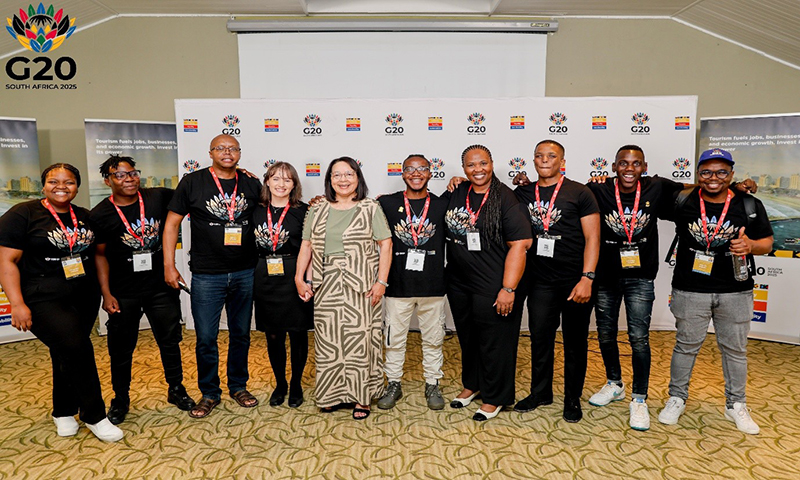By Gofaone Motsamai and Phenyo Mokgothu
Innovation, collaboration and youthful energy took centre stage in Mpumalanga at the Sabi River Sun Resort, when North-West University (NWU) students and an academic participated in the first G20 National Department of Tourism Hackathon.
Dr Ncedo ka Ntloko, senior lecturer in the School of Tourism Management at the NWU’s Mahikeng Campus, led one of the seven multi-university groups taking part in the event, while two of the school’s students, Ndumiso Mangena and Letlhogonolo Matjie, participated in the groupwork.
The event took place from 9 to 12 September 2025 and challenged tourism management students to design people-centred, technology-driven solutions for sustainable tourism, while giving them a platform to showcase their creativity before national and international leaders.
Each group worked alongside IT students and a technology specialist in a collaborative effort to combine digital innovation and tourism knowledge. The seven groups consisted of students from the University of Venda, University of Johannesburg, International Hotel School, Cape Peninsula University of Technology and Tshwane University of Technology.
They presented their prototypes to a judging panel of academics, industry leaders and technology specialists. The Minister of Tourism, Patricia de Lille, addressed the students and announced the winners.
A proud moment for the NWU came when the group led by Dr Ntloko secured second place. Their project, which won R140 000 in prize money, also earned them the opportunity to present before the G20 Tourism Ministers and representatives from eight guest countries on 12 September.
Rural application enriches experience of tourists and businesses
Dr Ntloko explained that his group’s innovation was a rural tourism-based solution powered by a solar hub and integrated with a smart app.
The app provides benefits for both local tourism businesses and visitors. For businesses, it offers registration and management tools, marketing and promotional opportunities, a smart tourism business map and access to accredited short programmes.
For tourists, the platform provides up-to-date information on rural businesses, simplifies navigation, enriches travel experiences and supports trip planning.
“Successful implementation of the project is anticipated to make rural entrepreneurs and communities more visible and accessible to global tourists,” said Dr Ntloko. “It will enhance tourist experiences, create opportunities for economic growth in rural areas, and promote cultural preservation – all of which contribute to sustainable tourism development.”
Next step: commercially viable solutions
The hackathon’s top three projects were well received by the national Department of Tourism and the international representatives. A financial commitment has been made to incubate these ideas and develop them into commercially viable solutions. The Department also confirmed that they are planning to make the hackathon an annual event, ensuring continuity for student-driven innovation.
Looking to the future, Dr Ntloko highlighted the importance of interdisciplinary collaboration in preparing students for such opportunities. “As the School of Tourism, we plan to work more closely with other faculties such as engineering and IT, depending on the scope of the project,” he said. “Collaboration is the most important lesson we have learnt in our hackathon journey, and it is pivotal for meaningful participation in innovation-driven platforms.”

Dr Ncedo ka Ntloko’s (third from the left) team was announced as second place winners of the National Department of Tourism’s Hackathon Project.
